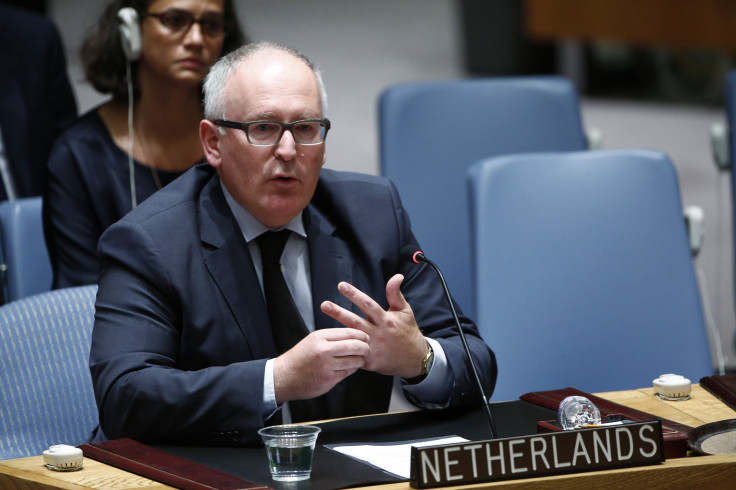European Economy Could Withstand Backlash From Russia Over Tougher Sanctions, Analysts Say

European officials have long resisted international calls to punish Russia for its involvement in the Ukrainian conflict, worried that a fallout with Moscow could lead to soaring energy costs and another financial crisis in the region. But some analysts say the European Union has enough economic heft to keep that from happening, even if the 28-nation bloc does impose harsher and more comprehensive sanctions against the Kremlin.
“The structure of the Russian economy is heavily reliant on European consumers,” Lavina Lee, a lecturer in Macquarie University’s history, politics and international relations department, wrote in an opinion piece on Tuesday. “The major EU countries could exercise economic leverage over Russia if they dared.”
European ministers took tentative steps in that direction on Tuesday, imposing additional visa bans and asset freezes on Russian officials considered responsible for the country’s actions in Ukraine. Frans Timmermans, the Dutch foreign minister, said the officials also asked the EU’s executive arm to prepare for more forceful sanctions against Russia’s arms, energy and financial sectors if President Vladimir Putin refuses to end Moscow’s destabilization of Ukraine, the Associated Press reported.
The decision follows the downing of Malaysia Airlines Flight MH17 last week over territory held by pro-Russian separatists in eastern Ukraine. The head of counterintelligence for Ukraine’s state security service on Tuesday blamed a Russian official for the plane attack, while Russia continues to deny any involvement in the incident.
Lee said the European Union’s member nations have so far failed to come up with a unified response to the Russia dilemma because of the countries’ disparate agendas and interests.
Britain’s financial services industry benefits significantly from Russian business activities, and France has a lucrative arms-trading relationship with Moscow, for instance, she said. And a handful of countries – Germany, Italy, Hungary, Bulgaria, Romania and Slovakia – are especially dependent on Russian exports of natural gas. Those nations could suffer acute supply shortages if Russia’s state-owned Gazprom decided to turn off the pipes.
The EU as a whole gets about one-third of its gas supplies from Russia, according to the statistics agency Eurostat, and about half of this volume is moved through pipelines in Ukraine.
Total, one of Europe’s largest energy companies, said that Europe could hypothetically cope with the cutoff of Russian gas supplies this winter if energy officials scrambled to put an alternative plan into place, David Ignatius, an opinion writer at the Washington Post, wrote last week. And in April, The Economist reported that a short-term supply disruption would cause only a limited amount of pain because some European countries have sufficient backup supplies.
Over the next few years, though, the continent would suffer severely if Russia decided to stop exporting gas to Europe. But U.S. analysts say they doubt that Gazprom would actually do that because Moscow needs the money too much, Ignatius noted.
Europe accounts for about one-third of Gazprom’s total gas sales, and about half of Russia’s fiscal revenue is tied to the oil and gas sector. Supply disruptions would “decimate the Russian gas industry and starve Gazprom” at a time when it needs money to invest in new facilities, a senior Obama administration official said, according to Ignatius' story.
Energy isn’t the only weak point for Europe. Concerns about damaging Europe’s trade ties with Russia have also left some officials wary of adopting harsh sanctions like those from the United States.
Russia is the EU’s third-biggest trading partner after the United States and China, and the Russia-EU trade in goods and services is valued at around $520 billion. The Netherlands government in particular has expressed concerns about rocking the trade boat.
“We are a small country, dependent on our exports, and unlike the United States, we cannot always react from our moral high grounds,” Alexander Pechtold, one of the main Dutch opposition leaders, told the New York Times last week.
Yet Russia is also dependent on its EU trade and would suffer from a breakdown in relations, Nina Shick of the Open Europe think tank told Marketplace on Monday. “We’re talking about things like machinery and medicine. These are things that Russia depends on, things that Russia won’t be able to source easily from other places.”
James Nixey of the Chatham House Institute in London told Marketplace that if harsh European sanctions ultimately led to an economic war with Russia, the EU would probably win.
“Any economic war would be compounded five-fold on Russia compared to that of the EU,” he said. “If it were to genuinely get serious, then the effects on Russia would be such that I think President Putin is actually a very worried man right now.”
© Copyright IBTimes 2024. All rights reserved.




















